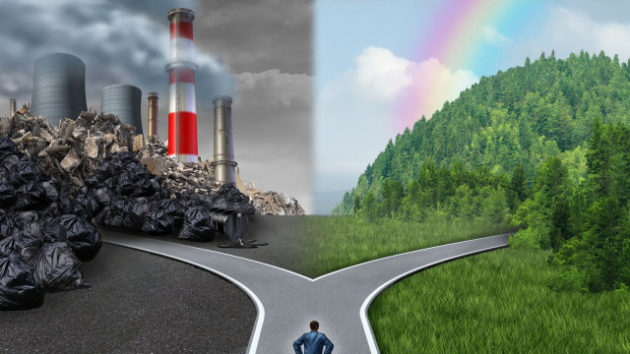A ‘Carbon Tax’ Is a Utopian Fix that Can’t Survive Contact with Political Reality by Diana Furchtgott-Roth
Paul Krugman, writing in the New York Times, suggests that Americans should pick a president who favors a carbon tax. But not even Democratic candidates Hillary Clinton and Bernie Sanders have proposed a carbon tax as part of their tax plans. All candidates have put forward detailed tax plans, and a carbon tax is not included in any of these plans.
What is a carbon tax? Why do so many academics and columnists love it? And why will Congress be unable to enact such a tax effectively?
No matter that only 16 percent of global greenhouse gas emissions are caused by America, and that by many measures global temperatures have not increased over the past decade. No matter than unless China and India reduce their carbon emissions, U.S. unilateral efforts will have no practical effect on global temperature. China has stated that it will reduce emissions in 2030, but has not made any definite commitment.
The carbon tax is a favorite of many academic economists for restructuring the tax system. Proponents include a bipartisan group of professors such as Tuft University’s Gilbert Metcalf, now Deputy Assistant Secretary for Environment and Energy at the Department of the Treasury; Harvard University’s Martin Feldstein, Edward Glaeser, and Gregory Mankiw; and Columbia University’s Joseph Stiglitz.
However, as tax practitioners know, a carbon tax is complex to set up. It requires adjustments to make sure that the tax is not unduly regressive and does not encourage consumption of imports relative to domestic production.
But, as we saw from the passage of many tax and budget bills over the years, Congress does not think deeply before it passes major tax bills.
Rather, political expediency always triumphs over academic elegance. Congress is incapable of thoughtful tax solutions, no matter how many are offered by well-intentioned professors. Despite years of notice that the Bush tax rates were due to expire, Congress passed permanent tax laws at the last moment, without reading the bill.
Many academics see a carbon tax as an alternative to an individual income tax, a corporate income tax, or a European-style cap-and-trade system. But a quickly-passed carbon tax in the hands of Congress would be just another add-on levy, with exemptions for friends and punishments for enemies.
A carbon tax raises the price of energy and so discourages consumption without regulation. Carbon tax rates could be calibrated to be revenue neutral or to yield a net rise in federal tax receipts, with the increment possibly dedicated to reducing deficits.
What are the problems with a carbon tax?
Everyone would want to spend the revenue. Some people would want to use it to reduce the deficit. Others would want to use carbon tax revenues to lower other taxes, such as income taxes. And since high income tax rates reduce incentives to work, this could conceivably add to economic efficiency.
Carbon taxes are regressive. Since low-income people use more energy as a percent of their income than high-income people, a switch to a carbon tax would have to be accompanied by transfers to low-income groups.
Some academics suggest that offsets be returned to taxpayers through lower income taxes, perhaps with the proceeds going chiefly to low-income households (individuals and families), which are disproportionately hurt by what is in essence an energy consumption tax.
This could theoretically be done by adjustments to the income tax. However, low-income earners are not required to file returns, and they would have to do so in order to be identified and compensated. That means extra work for them, and for the Internal Revenue Service — which will already be overworked calculating and collecting penalties from Obamacare violators.
Energy-intensive sectors lose under a carbon tax. The prices of energy-intensive goods in America would increase relative to imports from countries without carbon taxes. So Americans will prefer to buy imports, and American firms will lose business. Proponents of the tax suggest putting tariffs on imports in proportion to their carbon content so that American companies will not be at a disadvantage. But the precise quantities are complex to calculate, and tariffs might be illegal under World Trade Organization regulations.
The shale oil and gas that are attracting energy-intensive manufacturing back to America would be taxed, to the detriment of these new industries — and their employees. Some industries, such as coal, would be big losers. Politicians from coal-producing regions are influential in Congress, and they would demand a share of revenues.
So for a carbon tax to make our tax system more efficient, its revenues would have to be used to offset other taxes in the economy. Its negative effects on low-income Americans and on energy-intensive regions would have to be ameliorated. Some border adjustments would have to be made so that domestic goods were not disfavored.
But our disfunctional Congress is incapable of crafting a carbon tax with these attributes. Any tax on carbon would be an additional tax, without the offsets that make it so attractive to university professors. It would hurt the poor and raise domestic prices relative to prices of imports.
None of the front-running presidential candidates have proposed a carbon tax as part of their tax plans, because they know it is unpopular and will not pass Congress. To lower global emissions, the large emitters of carbon such as China and India need to move to nuclear power or natural gas. That would indeed make a difference.
This post first appeared at Economics21.org.
Diana Furchtgott-Roth, former chief economist of the U.S. Department of Labor, is director of Economics 21 and senior fellow at the Manhattan Institute.
RELATED ARTICLES:
Calls for Fracking Bans Ignore Sound Science
Taxpayers Are Footing Bill for Solar Project That Doesn’t Work




Leave a Reply
Want to join the discussion?Feel free to contribute!